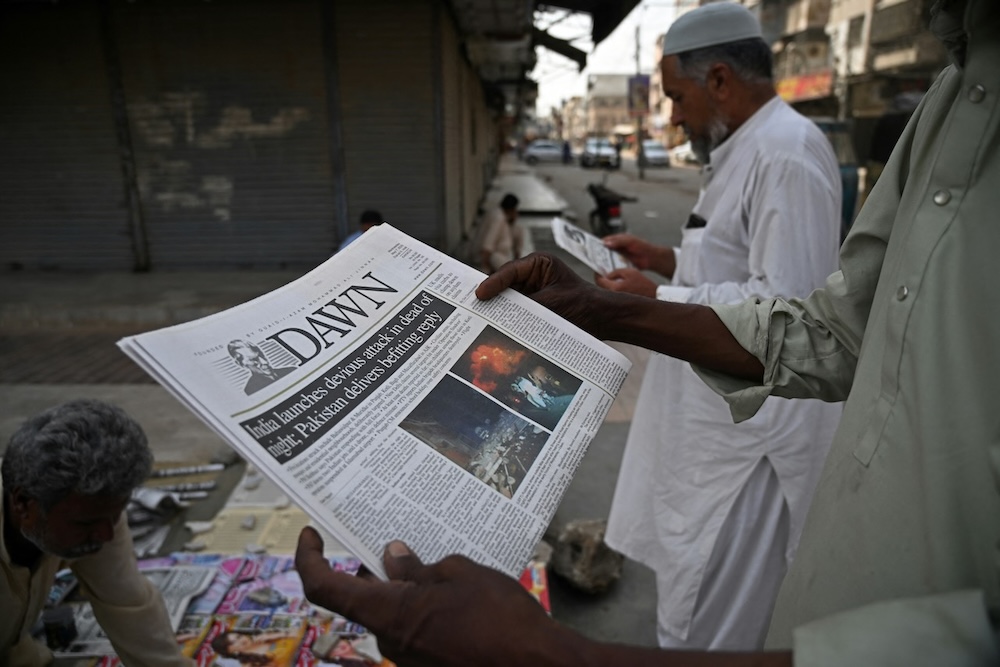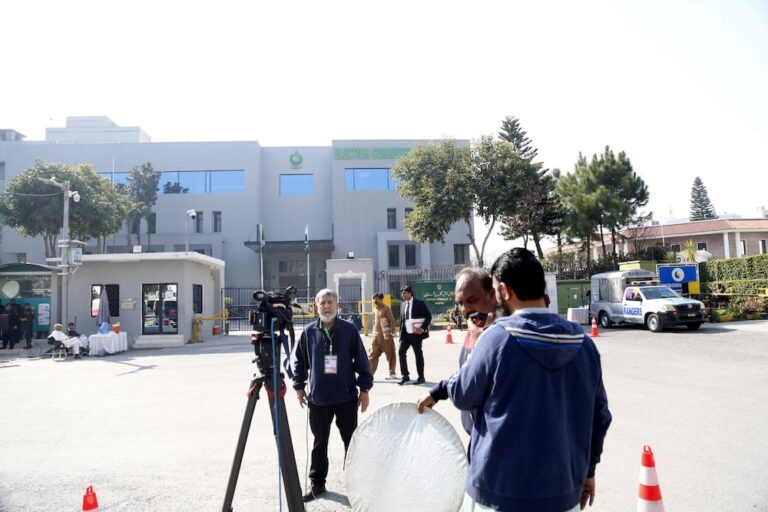Between January and December 2024, Pakistan Press Foundation has documented 168 attacks on journalists and media workers.
This statement was originally published on pakistanpressfoundation.org on 1 May 2025.
In 2025, journalists and media professionals in Pakistan find themselves amid an ever-tightening landscape for free expression. Legal challenges through restrictive legislation and cases, overactive regulatory authorities, continued violence against journalists with impunity, and threats to media professionals — the media is working in an environment of intimidation from all fronts.
This year began with the passage of the much-opposed Pakistan Electronic Crimes Amendment Act 2025 in January, which heightened concerns about the legal consequences journalists may face for their reporting, particularly online. Since then, criminal complaints have been registered against media professionals under sections of the amended cybercrime law including Section 26-A, which pertains to fake or false information and carries punishments of up to three years of imprisonment, fines up to Rs2million, or both.
In a media environment where broadcast media have been significantly silenced over the years through restrictive regulation and violence against media professionals, the further tightening of screws around expression online spells concern for journalists’ ability to report freely without consequences both online and offline. In what has become the norm, the lack of accountability and the role of state bodies — in 2024-25, the Federal Investigation Agency (FIA), in particular – has set a dangerous pattern of action against media professionals.
At the same time, forms of physical violence, including assault and manhandling as well as arrests, detentions, and the issuance of threats to journalists, continued to undermine the safety of media professionals and served as tools to intimidate the media alongside other punitive measures, including the suspension of advertising to media outlets.
In 2025, the Pakistan Press Foundation (PPF) has so far (January – April) documented at least 34 cases including seven instances of case registration, one defamation notice, three instances of call-up notices by the FIA, two arrests, four detentions, two abductions, at least six instances of assault and two of manhandling, two attacks on property including a raid, three instances of threats including a threat of legal action and threats to family, and two of online harassment.
The arrests of two journalists – Raftar CEO Farhan Mallick and Islamabad-based journalist Waheed Murad – in March, exemplified the heavy-handed approach of the FIA. In the case of Mallick, the FIA visited the Raftar office without notice, and following his appearance at an FIA office in response to a verbal summon, he was arrested.
Just days after Mallick’s arrest, Islamabad-based journalist, associated with Urdu News, Waheed Murad, was picked up from his home and had a criminal complaint registered against him by the FIA.
In addition to these, punitive measures including restrictions on advertising to certain media outlets have also been documented. The suspension of advertisements to Dawn, the leading English newspaper, which issued a public response defending its editorial policy, and the Ministry of Information’s stoppage of advertisements to Daily Sahafat, highlight the underhanded methods used to financially cripple media outlets.
The precedent for the alarming patterns observed this year appeared to have been set in 2024, an election year that was a mix of political protests, internet shutdowns, and policies and legislation (proposed and passed) that would increase the policing of free expression, particularly online.
Between January and December 2024, PPF documented at least 168 confirmed attacks on journalists and media professionals in connection to the work and attempts of censorship to regulate and restrict free expression either through punitive measures or regulation including two murders, 76 instances of assault, four instances of abduction, 12 attacks on property, five arrests, 12 detentions, 15 instances of case registration, eight documented instances of FIA action and two of other legal action, two instances of placement on the Exit Control List, 15 instances of online harassment, five threats, 31 instances of censorship including: 19 instances of Internet, mobile connectivity and social media platform disruptions including the ban on X, four restrictive directives by PEMRA, and eight other directives, orders or actions tantamount to censorship; and remarks by the Chief Minister of Khyber Pakhtunkwa province targeting journalists.
In 2024, the sheer frequency of internet, mobile connectivity, and social media platform disruptions are of grave concern. At a time when the significance of digital spaces is growing, such measures cut off citizens’ right to access information. As we continue with this year, the alarming patterns of censorship appear to once again be impacting journalists and media outlets in Pakistan. Following the escalation of tensions between India and Pakistan in the aftermath of the Pahalgam attack, the Indian goverment has blocked access to 16 Pakistani YouTube channels on the recommendations of its Ministry of Home Affairs.
On the occasion of World Press Freedom Day, PPF draws attention to the alarming patterns of intimidation being documented through legislation, legal cases, violence, and threats.
- PPF urges the state to view the media as an essential stakeholder while developing policies and laws that impact their work, so that dangerous legislation, such as PECA, the impact of which is unfolding, is not brought to fruition. Considering the impact on the media should not be an afterthought. Despite loud and clear calls of concern, the government has decided to ignore the opposition to the amendments to PECA. Such patterns raise questions about the government’s intentions.
- PPF reiterates the urgent need to challenge the complete impunity enjoyed by perpetrators of violence against the media through the active implementation of media safety legislation, passed in the country, specifically for the protection of media professionals. It is completely unacceptable that journalists continue to be targeted for their work. Despite the passage of the federal Protection of Journalists and Media Professionals Act, 2021, and the provincial Sindh Protection of Journalists and Other Media Practitioners Act 2021, journalists continue to face violence with dismal accountability for perpetrators.
- PPF is concerned by the lack of accountability and clarity in actions taken by state bodies such as the FIA, with details often being revealed in the aftermath of an incident. Such actions help maintain an environment of fear and uncertainty amongst the media, even beyond the individual journalists impacted. We urge authorities to ensure that media professionals are not targeted for their work and that due process is followed.



